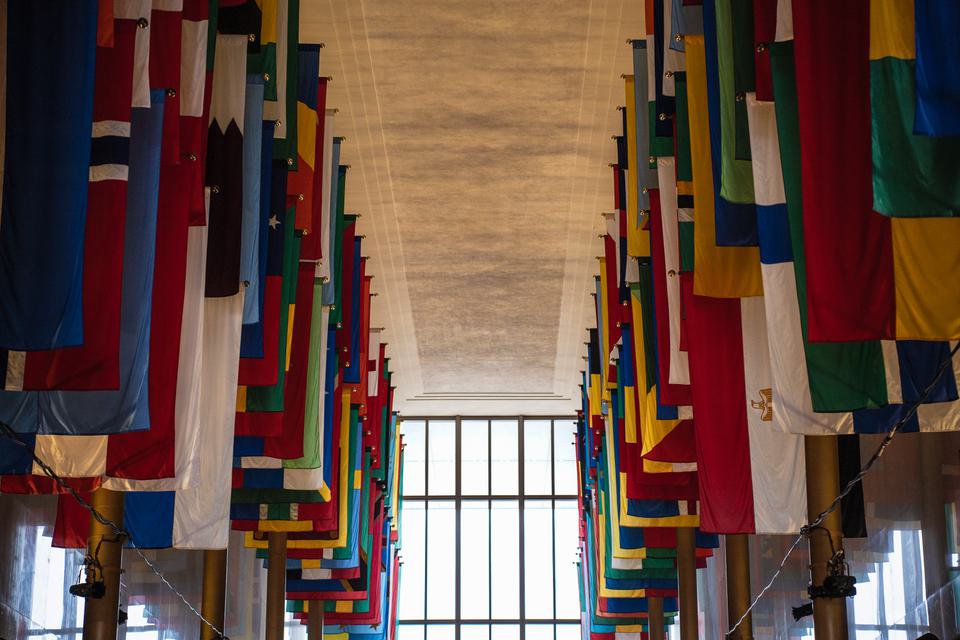The Death Penalty in 2024
International
The global community largely condemns use of the death penalty, with a majority of countries supporting a moratorium as a first step towards abolition. The death penalty has been abolished in practice or law in 144 countries, and 2024 saw abolition efforts progress in four countries. Despite this, known global executions increased in 2024 for the third straight year.

United States Fifth in Known Executions Worldwide, Behind Iran, Saudia Arabia, Iraq and North Korea
The global community largely condemns use of the death penalty, with a majority of countries supporting a moratorium on the use of the death penalty as a first step towards abolition. The death penalty has been abolished in practice or law in 144 countries, and 2024 saw legal abolition efforts progress in four more countries. Despite this, global executions increased in 2024 for the third straight year, led by Iran.
The United States is one of an increasingly isolated number of countries that retain and use the death penalty, making it an outlier among its closest allies, most of whom have long abandoned the practice and are vocal advocates in favor of abolition. Secrecy around the death penalty continues to impede a complete understanding of legal and execution practices in countries retaining the death penalty, including the United States. Vulnerable populations, such as ethnic, religious, or racial minorities, as well as the impoverished, psychosocially impaired, and juveniles continue to be overrepresented across death rows in most retentionist countries.
Continued Strong Support for Global Moratorium on the Death Penalty
The cross-regional support that the moratorium resolution enjoys shows that taking steps towards the abolition of the death penalty is not a matter of “culture” or “tradition.” States from all regions of the world, with different legal systems, traditions, cultures and religious backgrounds, have abolished the death penalty. It is a question of political will and commitment to respect, protect and fulfil all human rights, without discrimination.

Since 2007, the United Nations General Assembly has passed ten resolutions calling for a global moratorium on use of the death penalty, the latest on December 17, 2024. The 2024 resolution was adopted with the record-breaking support of 130 countries, up from 125 in 2022, and including most of America’s western allies, while 32 countries voted against the measure (five less than 2022) and 22 abstained. Once again, the United States voted against this year’s resolution, alongside China, Iran, and Saudi Arabia, all high-use retentionist countries.
Singapore and others proposed an amendment to the resolution reaffirming the “sovereign right of all countries to develop their own legal systems, including determining appropriate legal penalties, in accordance with their international law obligations.” It passed with an overwhelming majority with 105 votes in favor, 65 against, and 13 abstentions. The amendment implies that countries may ignore the resolution, or shield themselves from international scrutiny, and has come under criticism.
The resolution presented for adoption today is a call on States to consider applying a moratorium on executions. The implication of amendment L.54 is that States can use sovereignty as an excuse to disregard the universality of human rights and to consider this call to action as null and void.
Global Death Penalty Abolition Efforts Continue to Grow
Global efforts towards abolition were exemplified by legislative challenges to the practice in sub-Saharan Africa and judicial challenges in Taiwan. This year, Kenya and Zimbabwe considered abolition bills, while The Gambia initiated a constitutional amendment process to abolish the practice. It has been over a decade since any of these three nations carried out an execution: Kenya’s last execution occurred in 1987, Zimbabwe’s in 2005, and The Gambia’s in 2012. Following a legal challenge this year by 37 death row prisoners, the Constitutional Court of Taiwan ruled on the constitutionality of the death penalty on September 20. The Court decided that the death penalty was constitutional for the “most serious crimes,” such as intentional killings, and mandated that the government amend certain procedural rules within the next two years to better protect defendants’ due process rights. Although the decision did not eliminate the death penalty for those with mental and intellectual disabilities, the Court did find current provisions fail to adequately protect these vulnerable populations. Consequently, until new provisions meet constitutional standards, death sentences for these populations may not be carried out.
Global Executions Increase
Despite the overall global trend towards abolition, total known executions worldwide increased for the third consecutive year, led by Iran, Saudi Arabia and Iraq. As in 2023, Iran accounted for most of the global execution total with at least 800 documented executions as of December 1. In response to Iran’s persistent, aggressive use of the death penalty, nonviolent resistance efforts have emerged, such as the ongoing “No Death Penalty Tuesday” weekly hunger strike among Iranian prisoners. Saudi Arabia carried out an unprecedented 303 executions (as of December 3), in 2024, its highest ever total. Iraq, with at least 94 executions in 2024, experienced a dramatic increase from the 16 executions identified by Amnesty International in 2023.
| Rank | Country | Known Executions |
|---|---|---|
| 1 | Iran | 800 |
| 2 | Saudi Arabia | 303 |
| 3 | Iraq | 94 |
| 4 | North Korea | 32* |
| 5 | United States | 25 |
Data for Iran from the Abdorrahman Boroumand Center for Human Rights in Iran, as of December 1. Data for Saudi Arabia from Agence France-Presse, as of December 3. Data for Iraq and North Korea from the Cornell Center on the Death Penalty Worldwide, as of December 4 (*informed estimate due to state secrecy). Data for the United States from DPI.
China is widely regarded as the world’s leading executioner with thousands estimated to be executed annually, but information surrounding executions is considered a state secret.
Global Community Continues to Criticize Use of the Death Penalty in the United States
The United States has at times joined the international community in condemning unlawful actions by fellow retentionist countries, but the criticism has limited impact given the fact that America’s own use of the death penalty is often criticized by international human rights organizations. This year, the Inter-American Commission on Human Rights (IACHR) granted a precautionary measure for Brenda Andrew, the only woman on Oklahoma’s death row, calling on the United States to refrain from executing her. The United Nations’ report of the Secretary General to the General Assembly on the Question of the Death Penalty criticized the United States’ use of the death penalty on multiple fronts, including the disproportionate representation of Black people on U.S. death rows, the lack of legal protections for vulnerable populations such as those with severe mental illness and the elderly, and botched executions.
Secrecy Laws Prevent Meaningful Understanding of Death Penalty Use
Secrecy laws in many retentionist countries, including the United States, prevent a complete understanding of how the death penalty is used. Certain countries, such as China, North Korea, and Vietnam, classify the number of death sentences and executions as state secrets. Consequently, the execution totals reported by Amnesty International and others are an acknowledged undercount. Regarded as the world’s leading executioner, China is estimated to execute thousands of people each year. North Korea, with the fourth highest execution total this year, has carried out at least 32 documented executions, including public executions, which have also occurred in both Iran and Afghanistan.
Executions for Offenses that Do Not Meet the Threshold of a “Most Serious” Crime Continue
The International Covenant on Civil and Political Rights limits use of the death penalty to the “most serious offenses,” meaning intentional killings. But this year, people in countries across the world were charged and executed for non-serious offenses, such as sexual violence, homosexuality, blasphemy, fraud, security-related offenses, and drug-related offenses.
- In India, where some non-lethal sexual crimes are death-eligible, a revised criminal code went into effect on July 1, expanding the number of death-eligible offenses from 11 to 15, including gang-rape of a minor. On September 3, the West Bengal government in India adopted a bill that makes the death penalty a possible punishment for rape that results in the victim’s death or “vegetative state.”
- In Yemen, 22 individuals were sentenced to death in January and February on charges related to homosexuality. According to Human Dignity Trust, there are 12 countries where homosexuality is a death-eligible offense.
- In Pakistan, several people convicted of blasphemy were sentenced to death this year; the offenses include burning pages of the Quran and sharing photos and videos allegedly insulting the Prophet Muhammad on WhatsApp.
- In Vietnam’s largest ever financial fraud case, Truong My Lan was sentenced to death for committing $12.5 billion in fraud in April.
- In Iraq, there were at least two mass executions (21 people executed in September and 13 executed in April) for prisoners convicted on terrorism-related charges.
- In Iran, Saudi Arabia, Singapore, and a handful of other countries, executions for drug-related crimes continue, with the latest execution in Singapore of dual Singaporean-Iranian national Masoud Rahimi Mehrzad on November 29, 2024. Of the at least 800 executions in Iran, 50.75%, or 406 executions, were for drug-related crimes.
Vulnerable Populations Continue to Be Overrepresented on Death Rows Around the World
Vulnerable populations, such as ethnic, religious, or racial minorities, as well as the impoverished, psychosocially impaired, and juveniles are overrepresented across death rows in most retentionist countries. The United Nations Independent International Fact-Finding Mission on Iran, alongside human rights organizations, has noted that the Kurd and Baluch minorities, who also largely live below the national poverty line, are overrepresented among those executed in Iran. Released in October, a joint statement by seven human rights organizations called attention to nine juveniles at imminent risk of execution in Saudi Arabia, contradicting previous claims by officials pledging to end the unlawful practice. Somalia, which follows the U.S. as the country with the sixth highest execution total (as of December 1), executed four people in August for offenses they committed under the age of 18 while allegedly associated with Al Shabaab. The execution of these four, who were sentenced to death by a military court, drew criticism from UNICEF, which highlighted that military courts “lack specialized child justice procedures.”

